UPDATE 1/2/12: Here is an Arabic translation of the below English magazine:
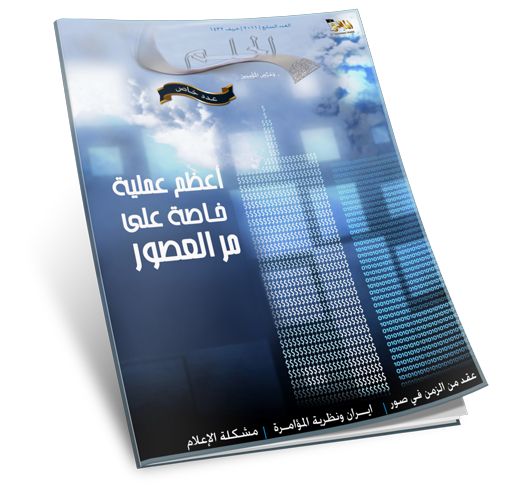
Click the following link for a safe PDF copy: Inspire Magazine 7 (Ar)
________
—
NOTE: This issue is their 9/11 special. For previous issues see: #6, #5, #4, #3, #2, and #1.
—

Click the following link for a safe PDF copy: Inspire Magazine 7
______
Category: AQAP
al-Malāḥim Media presents a new video message from al-Qā’idah in the Arabian Peninsula: "Story of the Escape, Part 1"
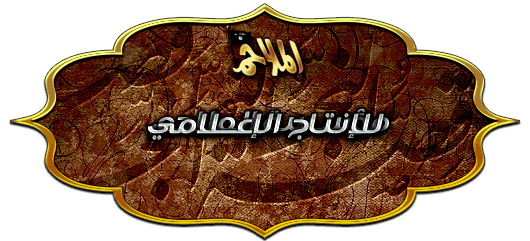
[wpvideo qsULL2b6]
_______
al-Malāḥim Media presents two new statements from al-Qā’idah in the Arabian Peninsula
UPDATE 9/16/11 8:58 AM: Click here for an English translation of the first Arabic statement listed below.
_______
—

Click the following links for safe PDF copies:
al-Qā’idah in the Arabian Peninsula — Statement Claiming Responsibility For The Martyrdom Operation Against the Ḥūthīs That Killed and Wounded Hundreds
al-Qā’idah in the Arabian Peninsula — Report on the Bombing of the Hospital in Ja’ār
______
al-Malāḥim Media presents a new audio message from al-Qā’idah in the Arabian Peninsula’s Hārith bin Ghāzī al-Naẓārī [Muḥammad al-Mirshadī]: "The First Episode: Virtues of Martyrdom and Dignity of the Martyr"
UPDATE 9/11/11 2:15 PM: Here is an Arabic transcription of the below audio message:
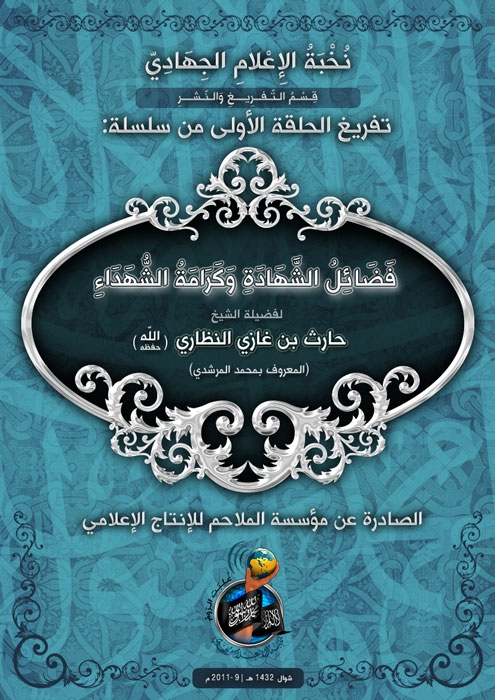
Click the following link for a safe PDF copy: Hārith bin Ghāzī al-Naẓārī [Muḥammad al-Mirshadī] — “The First Episode- Virtues of Martyrdom and Dignity of the Martyr” (Ar)
_______
—

Hārith bin Ghāzī al-Naẓārī [Muḥammad al-Mirshadī] — “The First Episode- Virtues of Martyrdom and Dignity of the Martyr”
_______
al-Malāḥim Media presents a new audio message from al-Qā’idah in the Arabian Peninsula's Hārith bin Ghāzī al-Naẓārī [Muḥammad al-Mirshadī]: "Da'wah For Jihād"
UPDATE 9/5/11 9:41 AM: Here is an Arabic transcription of the below audio message:
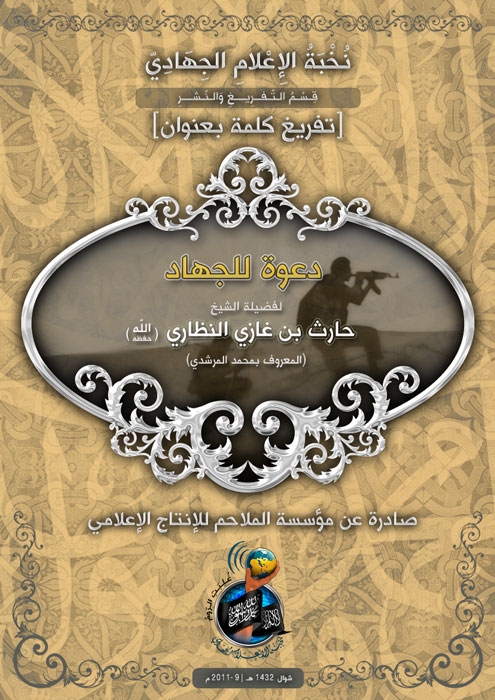
Click the following link for a safe PDF copy: Hārith bin Ghāzī al-Naẓārī [Muḥammad al-Mirshadī] — “Da’wah For Jihād” (Ar)
______
—

Hārith bin Ghāzī al-Naẓārī [Muḥammad al-Mirshadī] — “Da’wah For Jihād”
______
al-Malāḥim Media presents a new video message from al-Qā’idah in the Arabian Peninsula: "He Takes Martyrs From You #3: Hānī al-Sha’lān"
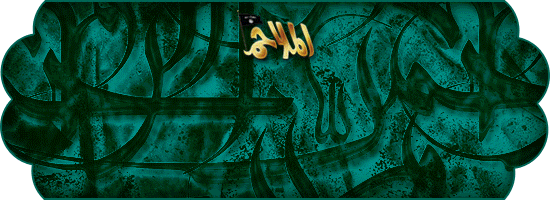
[wpvideo 7JMxtVEe]
al-Malāḥim Media presents a new audio message from al-Qā’idah in the Arabian Peninsula's Shaykh Ibrāhīm bin Sulaymān al-Rubaysh: "They Destroyed Their Homes With Their Hands"
UPDATE 9/25/11 11:24 AM: Here is an English translation of the below Arabic audio message:

Click the following link for a safe PDF copy: Shaykh Ibrāhīm bin Sulaymān al-Rubaysh — “They Destroyed Their Homes With Their Hands” (En)
______
—
UPDATE 8/31/11 9:27 AM: Here is an Arabic transcription of the below audio message:
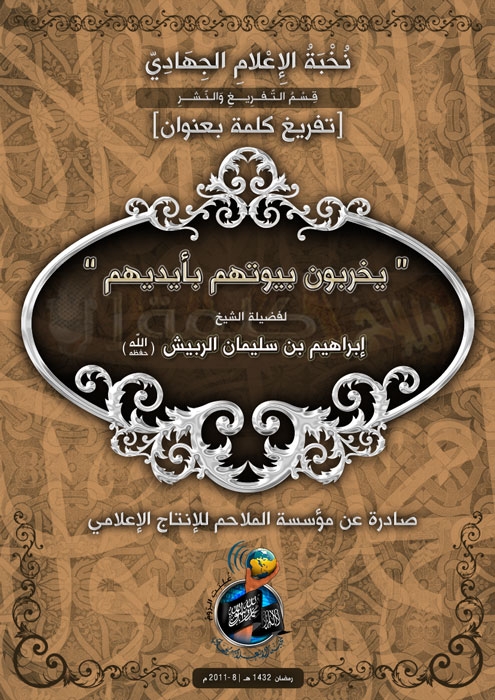
Click the following link for a safe PDF copy: Shaykh Ibrāhīm bin Sulaymān al-Rubaysh — “They Destroyed Their Homes With Their Hands” (Ar)
______
—

Shaykh Ibrāhīm bin Sulaymān al-Rubaysh — “They Destroyed Their Homes With Their Hands”
______
al-Malāḥim Media presents a new statement from al-Qā’idah in the Arabian Peninsula: "Lamentations for the Shaykh of the Mujāhidīn Usāmah Bin Lāden"
UPDATE 5/19 8:53 AM: Click here for a English translation of the below Arabic statement.
—



Click the following link for a safe PDF copy: al-Qā’idah in the Arabian Peninsula — “Lamentations for the Shaykh of the Mujāhidīn Usāmah Bin Lāden”
_____
English translation of 'Abd al-Raḥman al-Farraj’s “Where Are Those Who Roll Up Their Sleeves?” from Issue #16 of al-Qā’idah in the Arabian Peninsula’s Ṣadā al-Malāḥim Magazine
NOTE: You can read the entire sixteenth issue here.
—
Greatness does not approach anyone. If greatness were like that, any humble person would have soared and inferior persons would become comparable to people of high rank and glory.
He who gives preference to this world, betrays the cries of his brothers, and sleeps through the advance of the rapacious armies is not the equal of he who in whom the spirit of sacrifice and redemption has manifested itself and who has gone forth to renew for Islam the fearless deeds of its knights that are almost forgotten.
That one is he who refused to kneel to those who would enslave mankind. He would not yield or submit and chose to be slain honorably than to live in degradation. With his pure blood he begins to quench the spirits of those who almost died of thirst.
“Not equal are those believers who sit (at home) and receive no hurt, and those who strive and fight in the cause of Allah with their goods and their persons. Allah hath granted a grade higher to those who strive and fight with their goods and persons that to those who sit (at home). Unto all (in Faith) hath Allah promised good: but those who strive and fight hath He distinguished above those who sit (at home) by a special reward,-“ (Al-Nisa’: 95).
Would you not prefer to be of the party that has been commended by Allah on High and the elite of his messengers in the hearing of those Allah has chose to be His companions. Would you not like to be one of those free men holding the pebbles? Your Lord laughs when one of them plunges into hosts of kufr and apostasy and makes them taste the fortitude of the free and zealous muhajir to Allah.
By Allah, it is the best life and the best death. It is a life that will make Allah pleased with you, so he will reward you for your sleep and for your wakefulness. You will reap the reward of he who fasts and never breaks his fasts, of he who prays constantly; a mighty one feared by the enemies of Allah, an impregnable fortress the tyrants dread to approach. You meet Allah drenched in your own blood for the sake of pleasing Him, so you win his forgiveness and munificence. He elevates you to a high rank and you, by the mercy of Allah, are placed in the company of the prophets, the righteous and the martyrs, and you associate with them in Allah’s paradise.
Roll up your sleeves, slave of Allah, for you must answer the best of calls, and divorce this world thrice. Proceed with this Strange group to taste the sweetness of Faith and the sweetness of ghurbah that will prevail over its bitterness. By Allah, the deluded does bad deeds because of his delusions and they (bad deeds) turn him away from the correct path. I beseech Allah not to make me and you among those who think that by their idleness they do good. How sad is the day when the idle one perceives his sins and sees the harsh reckoning.
“As to these, they love the fleeting life, and put away behind them a day (that will be) hard,” (Al-Insan: 27).
How joyful is the martyr on the day when he meets Allah and his sins are forgiven with the first drop of his blood.
“They rejoice in the bounty provided by Allah. And with regard to those left behind, who have not yet joined them (in their bliss), the (martyrs) glory in the fact that on them is no fear, nor have they (cause to) grieve.” (Al-iImran: 170) .
Today is the time of deeds, tomorrow is the day of reckoning.
Upon the martyr Allah has bestowed these qualities:
– He is forgiven with the shedding of the first drop of his blood.
– He will see his place in Paradise
– He will be adorned by the ornament of faith.
– He will be married to 72 wives from among the hour al-ayn
– He will be spared the torments of the grave
– He is safe from the great terror
– A precious crown of reverence will be placed upon his head, the worth of which is greater than the world and everything in it.
– Intercession will be made for 70 members of his household
All of this are the reward of those who answer the call of Allah and His messenger, Allah’s blessing and peace be upon him.
So resolve with the determination of one who has put his trust in Allah to be among them and to follow in their footsteps and proceed on their path. Keep in your sights only the gratification of Allah. Do not be distracted by those who seek to discourage you. The promised place, if we are true, is Paradise.
In the name of Allah, latch your heart to creed of trusting in Allah, who never abandons his servants. Make for this caravan. It is the caravan of salvation and the caravan of those who are marching to Allah. Hurry and do not delay. Answer the call of Allah, and rejoice in Allah’s promise.
“All who obey Allah and the apostle are in the company of those on whom is the grace of Allah, of the prophets (who teach), the sincere (lovers of Truth), the Witnesses (who testify), and the Righteous (who do good): ah! What a beautiful fellowship!” (Al-Nisa:’ 69).
Translated From Sada al-Malahim Magazine Issue #16
_____
Ghorfah Minbar al-Anṣār presents a new audio message from al-Qā’idah in the Arabian Peninsula's Shaykh Abū Zūbayr 'Adīl bīn 'Abdullah al-Abāb
UPDATE 5/26 9:23 AM: Click here for an English translation of the below Arabic audio.
______
—

Ghorfah Minbar al-Anṣār presents a new audio message from al-Qā’idah in the Arabian Peninsula’s Shaykh Abū Zūbayr ‘Adīl bīn ‘Abdullah al-Abāb
_____
